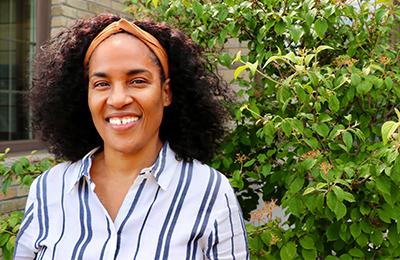Seeking answers about COVID-19 and its impact on Black communities in Canada

Feeling the burden to better understand COVID-19 and the devastating effect it is having on Black communities in Canada, Dr. Michelle Barton-Forbes partnered with colleagues on the seroMARK research study
By Jennifer Párraga, BA’93
Finding answers; it’s what drives Dr. Michelle Barton-Forbes.
“I’ve always had an inquiring mind,” she said. “I love clinical medicine, but I’m challenged by not always having the answers. I’m always pushing to find answers through research.”
A paediatrician and Chief of Paediatric Infectious Diseases at London Health Sciences Centre’s Children’s Hospital, she says that it was during her training that she truly appreciated the power of research and her role in advancing it.
As a medical student in Jamaica, Barton-Forbes completed a rotation at an institution offering long-term care for infants who were left with severe hydrocephalus as a result of complicated bacterial meningitis.

“I was particularly curious, as I knew industrialized countries were reporting success in preventing bacterial meningitis with the roll-out of the Haemophilus influenzae type b (Hib) vaccine,” she said.
Devastated by their condition, Barton- Forbes decided to focus her research during residency training on Hib infections, which cause meningitis in young children. Prior to her research there was no published data on the epidemiology of this infection in Jamaican children and without it, practitioners generally did not appreciate the severity of the problem.
“It broke my heart and I thought to myself, surely there is something that we can do about this. I’ve got to prove that H flu is a major player in causing this.”
At the time, the Hib vaccine was not a part of the vaccine schedule for Jamaican children. And it was the findings from Barton-Forbes’ study that helped to inform the process for the inclusion of this vaccine in the national immunization schedule.
She subsequently conducted a study on epidemiology of Pneumococcal disease, another important vaccine-preventable cause of meningitis. The data from that important follow-up study provided support for the rollout of the pneumococcal vaccine as a part of the country’s vaccine schedule. These two major interventions have reduced the incidence of meningitis in her home country.
“If this study can help us to better understand the risk factors of the COVID-19 infection and severe outcomes in Black Canadians, we have the opportunity to help direct the development of new or enhanced public health policies. I am hopeful that we can also advocate for increased funding for the establishment of culturally sensitive care. By doing so, then I believe we would have made a significant difference.”
— Dr. Michelle Barton-Forbes
“It was exciting to see that research could provide such important insight and guidance,” she said.
So began a journey with infectious disease research seeking to answer questions for vulnerable patients and communities.
In the spring of 2020, as more evidence began to mount about the prevalence of COVID-19 in Black communities in Canada, Barton-Forbes was motivated to better understand the disease and find answers.
So when Dr. Upton Allen, Professor, Paediatrics at the University of Toronto and Chief of Infectious Disease at The Hospital for Sick Children reached out to her to partner with the seroMARK project, she responded immediately. In doing so, she joined a research group that is part of a multi-centre partnership involving investigators from the University of Toronto, York University, Ryerson University, as well as public health and a growing list of provincial and national collaborators.
Through antibody testing and data collection, the study aims to determine the prevalence of COVID-19 infection in Black Canadian communities, the level of immunity to COVID-19 within these communities, and the risk factors associated with both contracting the infection and having poor outcomes.
The study boasts strong engagement with the Black community. Well aware of the existing challenges that Black and marginalized communities encounter with the health care system, the researchers recognized the importance of stakeholder buy-in.
“Data-gathering and interventions are most successful when people feel they are part of what is happening,” said Barton-Forbes.
It’s why prior to rollout of the project they connected with influential leaders from the Black community.
Out of the gate, community advisory groups in Toronto and London were established with representation or input from physicians, Black academic, business, religious and community leaders, as well as public health colleagues, experts in equity, diversity and inclusion and individuals with lived experience.
Barton-Forbes says that despite her heavy clinical practice, she was highly motivated to devote countless hours to this project.
Through weekly meetings the advisory groups worked together to better understand the diverse Black communities living in the region, their needs and the limiting barriers to health and health care.
The sessions provided the teams with important information and better insight that, along with the initial pilot study, allowed the teams to tweak the approach to the study to optimize interest and improve study participation.
“The several months of weekly meetings with the advisory group in London paid off with a high turnout from the Black community in our very first recruiting event,” Barton-Forbes said. “We could not have had this success without the amazing input and hard work of the community advisory group, research support staff, as well as hospital and university leadership.”
The community engagement and interinstitutional partnerships of this project illustrate two key goals in Schulich Medicine & Dentistry’s new five-year Strategic Plan and the Partnerships priority. There’s no question that fostering and nurturing partnership as Barton-Forbes has done through this study will be critical to the School’s success and the health and well being of the communities of Southwestern Ontario.
Barton-Forbes says that they expect data around occupations such as those considered frontline, as well as socioeconomic status to reveal a compelling story.
Importantly, they hope to inform policies, as well as measures that will improve health and safety and ultimately reduce the risk of COVID-19 in Black communities.
Building on the trust that the team has established with the Black community through almost a year-long engagement process, and as the country moved into a new phase of increased vaccine distribution, Barton-Forbes says that the team is in a good position to understand the issues around vaccine hesitancy in this population.
“We have an important role to play working with our local public health authorities to combat several of the myths around vaccines that create challenges to maximize uptake in this population,” she said.
Barton-Forbes is also hopeful that as vaccination rates improve in this community in the coming months, antibody testing being done as a part of their study may also provide insight into vaccine responses in this population.
“As a physician and researcher, I want to see greater equity in health care delivery and have every citizen benefit from what our systems have to offer,” she said.
“If this study can help us to better understand the risk factors of the COVID-19 infection and severe outcomes in Black Canadians, we have the opportunity to help direct the development of new or enhanced public health policies. I am hopeful that we can also advocate for increased funding for the establishment of culturally sensitive care. By doing so, then I believe we would have made a significant difference.”








